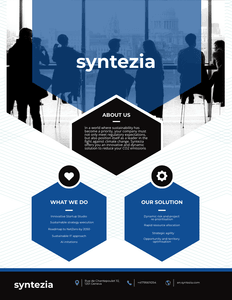Go Back

syntezia CSDDD
We support you in implementing your action plan in order to comply with the law on the European duty of vigilance, or CSDD (Corporate Sustainability Due Diligence Directive). This directive proposed by the European Commission which aims to regulate corporate social and environmental responsibility obligations (CSR), and to apply the notion of “duty of vigilance” at the European level. Companies have a legal responsibility to be “vigilant” regarding abuses related to human rights or social and environmental issues throughout their value chain. This means carrying out assessments to identify sustainability risks, or risks related to human rights abuses, across their entire supply chain (including their suppliers and business partners). They must also take measures to prevent these risks and abuses throughout their value chain.
More Details
We support you to help you comply with the European CSDDD directive at each key stage.
1. Determine if your business is subject to the CSDDD
The directive applies to a wide range of businesses, including:
- Large publicly traded companies (more than 500 employees)
- Certain large unlisted companies (more than 500 employees and turnover above 40 million euros or balance sheet total above 20 million euros)
- Small and medium-sized companies listed on the stock exchange (from 2026)
2. Identify the information to disclose
The CSDDD requires companies to disclose information on a wide range of topics, including:
- Sustainability strategy and governance
- Environmental impacts (greenhouse gas emissions, energy consumption, etc.)
- Social impacts (working conditions, diversity and inclusion, etc.)
- Impacts on human capital (training, skills development, etc.)
- Impacts on society and local communities
- Fight against corruption and bribery
3. Comply with reporting requirements
Companies must:
- Publish an annual sustainability report
- Use the sustainability reporting standards of EFRAG (European Financial Reporting Advisory Group)
- Have their sustainability report verified by an independent auditor
4. Become familiar with the penalties for non-compliance
Companies that fail to comply with the CSDDD may be subject to sanctions, such as:
- Almonds
- Injunctions
- Exclusion from public procurement
5. Keep up to date with developments
The CSDDD is a directive in constant evolution. It is important to stay abreast of the latest developments and update your practices accordingly.



